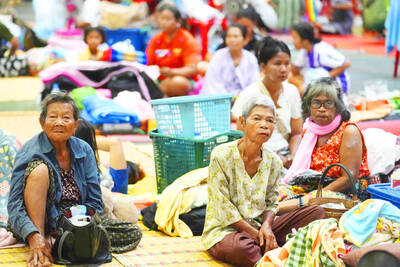Australia's government yesterday defended its new carbon trading scheme, insisting it would reduce emissions and telling critics it was better than nothing.
Climate Minister Penny Wong on Wednesday unveiled a “cap-and-trade” scheme to be introduced by 2010, which she said was the country’s most significant economic reform in a generation.
Green groups and economists, however, immediately criticized the plan, saying it did not do enough to cut greenhouse gases blamed for global warming.
But Prime Minister Kevin Rudd hit back yesterday, saying the move would work.
“The whole point of the system is to reduce emissions,” he told national radio.
“Nothing’s going to be perfect but it certainly beats sticking your head in the sand, which is what the Liberal Party has been doing for 12 years,” Rudd said.
Australia is one of the highest per capita carbon polluters in the world and only signed up to the Kyoto Protocol on climate change last year, after Rudd’s landslide defeat of former prime minister John Howard.
Under the scheme, the government sets an overall limit on the amount of carbon the economy can produce and then provides permits to industry up to the nominated amount.
Companies can then trade their permits, meaning carbon-heavy industries must pay extra if they want to exceed their allocation, a system the government believes will provide a market-based incentive to reduce pollution.
Gas taxes will be cut so motorists already hit by high oil prices will not have to pay more, while low-income families facing higher electricity bills will receive compensation.
Heavily polluting industries will also receive free carbon permits, while the drought-hit agriculture sector will be exempt until 2015.
Treasurer Wayne Swan said the central Reserve Bank of Australia would “look through” the scheme, but added that indications were its effect on inflation would be “one-off” and it might have no impact on rates.
Interest rates are currently at historic highs as the government battles to rein in inflation.
The government estimates that if the carbon price is set at A$20 (US$19.50) per tonne, the cost of living will rise by 0.9 percent.
However, critics say the government is being too soft on the heavy polluters, adding they should not get the concessions.
Speaking from New Zealand, where he is studying a similar scheme there, Swan told national radio yesterday: “We have said we will provide some assistance which may include some free permits but we are not going to be allocating, willy nilly, free permits to strongly affected industries.”

FOREST SITE: A rescue helicopter spotted the burning fuselage of the plane in a forested area, with rescue personnel saying they saw no evidence of survivors A passenger plane carrying nearly 50 people crashed yesterday in a remote spot in Russia’s far eastern region of Amur, with no immediate signs of survivors, authorities said. The aircraft, a twin-propeller Antonov-24 operated by Angara Airlines, was headed to the town of Tynda from the city of Blagoveshchensk when it disappeared from radar at about 1pm. A rescue helicopter later spotted the burning fuselage of the plane on a forested mountain slope about 16km from Tynda. Videos published by Russian investigators showed what appeared to be columns of smoke billowing from the wreckage of the plane in a dense, forested area. Rescuers in

POLITICAL PATRIARCHS: Recent clashes between Thailand and Cambodia are driven by an escalating feud between rival political families, analysts say The dispute over Thailand and Cambodia’s contested border, which dates back more than a century to disagreements over colonial-era maps, has broken into conflict before. However, the most recent clashes, which erupted on Thursday, have been fueled by another factor: a bitter feud between two powerful political patriarchs. Cambodian Senate President and former prime minister Hun Sen, 72, and former Thai prime minister Thaksin Shinawatra, 76, were once such close friends that they reportedly called one another brothers. Hun Sen has, over the years, supported Thaksin’s family during their long-running power struggle with Thailand’s military. Thaksin and his sister Yingluck stayed

‘ARBITRARY’ CASE: Former DR Congo president Joseph Kabila has maintained his innocence and called the country’s courts an instrument of oppression Former Democratic Republic of the Congo (DR Congo) president Joseph Kabila went on trial in absentia on Friday on charges including treason over alleged support for Rwanda-backed militants, an AFP reporter at the court said. Kabila, who has lived outside the DR Congo for two years, stands accused at a military court of plotting to overthrow the government of Congolese President Felix Tshisekedi — a charge that could yield a death sentence. He also faces charges including homicide, torture and rape linked to the anti-government force M23, the charge sheet said. Other charges include “taking part in an insurrection movement,” “crime against the

POINTING FINGERS: The two countries have accused each other of firing first, with Bangkok accusing Phnom Penh of targeting civilian infrastructure, including a hospital Thai acting Prime Minister Phumtham Wechayachai yesterday warned that cross-border clashes with Cambodia that have uprooted more than 130,000 people “could develop into war,” as the countries traded deadly strikes for a second day. A long-running border dispute erupted into intense fighting with jets, artillery, tanks and ground troops on Thursday, and the UN Security Council was set to hold an emergency meeting on the crisis yesterday. A steady thump of artillery strikes could be heard from the Cambodian side of the border, where the province of Oddar Meanchey reported that one civilian — a 70-year-old man — had been killed and